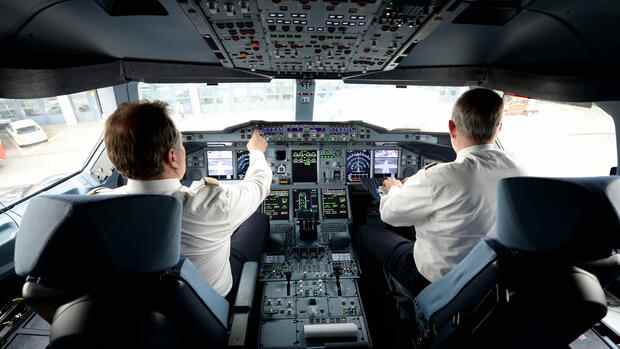The pilot association Vereinigung Cockpit is currently letting the pilots of the core Lufthansa brand vote on strike measures.
(Photo: picture alliance/dpa)
Frankfurt Can it really happen that after the warning strike by the ground staff this Wednesday, the pilots of Lufthansa’s core brand will soon stop working – just at a time when the entire industry is struggling to restart after the pandemic? Just in the high summer holiday season, when half the republic is looking for the distance after two years of pandemic restrictions? It can.
The ballot has been running for a few days. If at least 70 percent of the pilots agree by the end of July, there may be labor disputes at Lufthansa from August. A strike would be devastating for the company.
Even without labor disputes, the situation at many German airports is unbearable. The largest German hub in Frankfurt managed to compensate for the sometimes massive staff shortages by canceling flights and extra shifts last weekend. The feared chaos at the beginning of the holidays in Hesse, Rhineland-Palatinate and Saarland did not materialize.
But operations at Cologne Airport almost collapsed. Passengers had to wait for hours in front of security checks, and many missed their flights. After two years of the pandemic, the aviation industry is currently giving a disastrous picture.
Top jobs of the day
Find the best jobs now and
be notified by email.
Labor disputes will add to the chaos. Even the one-day strike by Lufthansa ground staff this Wednesday will disrupt operations.
>> Read about this: Lufthansa canceled more than 1000 connections, 134,000 passengers were affected.
If work stoppages also occur on the part of the cockpit staff, flying finally becomes a gamble for the badly battered passengers.
Currently it does not look as if a solution to the conflict can be found. The situation is deadlocked. Management and pilot representatives have missed the opportunity to put their difficult relationship on a new footing during the pandemic.
Old conflicts are now erupting again – above all the question of how large the fleet and the group of so-called KTV pilots will be in the future. KTV stands for Group Collective Agreement, it is the best equipped in the Lufthansa Group.
Because there is a lack of staff, there are endlessly long waiting times at German and many European airports.
(Photo: ddp/Panama Pictures)
Both sides are trapped in their thought patterns that have overshadowed the collective bargaining conflicts for decades. It’s time for a complete fresh start between management and flight crew.
Lufthansa can no longer afford to make a makeshift and superficial solution to the conflict that keeps breaking out with rotten compromises. This robs the group of any flexibility, frustrates the team and jeopardizes the recovery of the debt-ridden balance sheet. Without a fresh start, the number four in global aviation is threatened with relegation from the top ten.
This can only be prevented if both sides completely free themselves from previous paradigms. The management is driven by the feeling of being surrounded by unions, which use their extremely sharp weapon strike to achieve their goals – especially those of the KTV pilots. The most effective means of resistance for the group management is the constant establishment of new airlines that are not subject to the influence of the powerful representatives of the KTV pilots.
This is what happened with Germanwings, Eurowings and Eurowings Discover, as planned with the new platform, which is internally called Cityline 2.0. It is the transfer of the logic known in the industry to aviation: if production becomes too expensive somewhere, move it to where it is cheaper.
The problem: It doesn’t take long for the union to expand its sphere of influence to include the new flight operations. In addition, the new airlines often had to be wrested with concessions from the unions for the sake of social peace – at the expense of competitiveness. In any case, the large number of flight operations increases the already great complexity in the Lufthansa Group.
The VC union, on the other hand, has been fighting a design flaw for decades. Each airline has its own tariff committee. The union dominates that of the KTV pilots in particular. The interests of other pilot groups sometimes get lost.
This not only causes discord in the VC. It also makes collective bargaining more difficult. There is always a group somewhere that immediately says: “Not with us!”
Lufthansa and employee representatives must finally free themselves from this dangerous spiral. It cannot be in the interest of either the pilots or the Lufthansa management to take themselves out of the international competition. And that’s certainly not in the interests of the passengers.
More: 6000 flights canceled – why a Lufthansa board does not see a quick end to the flight chaos.
